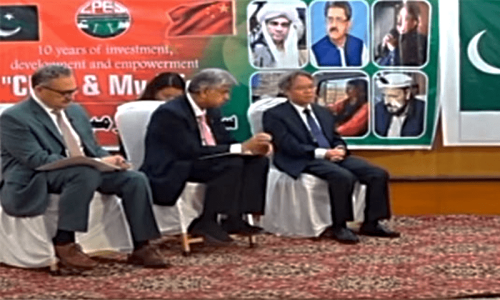
• Crucial agreement signed to cut cost of cross-country Main Line-1 rail link
• Pakistan Refinery inks $1.5bn deal to boost petrol, diesel production
• PM Kakar looks to Beijing for help to diversify export basket, expand industrial base
ISLAMABAD: Pakistan and China on Wednesday agreed to expand the scope of the multibillion-dollar CPEC infrastructure project, which will now diversify to areas like industrial development, ICT, livelihood projects, mining and mineral exploration, and agriculture. Presently, the corridor is confined to road and rail connectivity and economic zones.
Both countries also signed an agreement on the strategic Main Line-1 (ML-1) rail project, the Ministry of Railways said.
Both sides also agreed to strengthen high-level dialogue and engagement besides deepening the political, economic, education, science and technology, cultural, and people-to-people relations.
The commitments came during Caretaker Prime Minister Anwaarul Haq Kakar’s meeting with the top Chinese leadership. Mr Kakar is in China to attend the 3rd Belt and Road Forum in Beijing.
According to the Prime Minister’s Office (PMO), bilateral ties were discussed in a meeting between Prime Minister Kakar and Chinese Premier Li Qiang on the sidelines of the conference.
The two leaders also witnessed the signing ceremony in which several memorandums of understanding (MoUs) and agreements were signed in the areas of commerce, communication and transport, including the Main Line-1 (ML-1) rail agreement, food security and research, media exchanges, space cooperation, urban sustainable development, capacity building, mineral development and industrial cooperation, climate change, vaccine development.
The United Energy Group of China and Pakistan Refinery Ltd signed an MoU for a $1.5 billion investment to boost the refinery’s production capacity. The agreement will help increase the PRL’s petrol production capacity from 250,000 tonnes to 1.6 million tonnes and high-speed diesel from 600,000 tonnes to 2m tonnes.
ML-1
In Islamabad, Railways Secretary Syed Mazhar Ali Shah said in a statement that work on the ML-1 would kick off shortly. The rail project, whose cost has been revised downwards from $9bn to $6.7bn, will span 1,733 kilometres, connecting Peshawar to Karachi. Besides, the number of trains travelling to and from both cities could potentially expand to 100.
The crucial agreement, signed in Beijing, would help transform Pakistan’s entire transportation network, Mr Shah said. He hoped the rail project would propel Pakistan Railways’ market share from 4pc to 20pc and create 20,000 jobs for technical experts.
‘Shared prosperity’
During the meeting, Mr Kakar described the Belt and Road Initiative (BRI) as a project of immense significance for the world in terms of connectivity and shared prosperity.
As CPEC has crossed its 10-year mark, Mr Kakar hoped the project’s next phase would uplift rural farmers, foster education, bolster small businesses, generate many jobs and alleviate poverty.
He said Pakistan’s collaboration with China in the information technology sector and CPEC’s green corridor would ensure modernisation, food security, and agricultural and environmental protection.
“This vision promotes cooperation, collective security, inclusive and sustainable development, and a balanced ecosystem as the only way to address global challenges,” he said.
Prime Minister Kakar expressed confidence that Chinese investment in special economic zones (SEZs) would help diversify Pakistan’s export basket and expand its industrial base.
Premier Li Qiang of China underlined the steady growth of bilateral cooperation and noted the positive momentum of CPEC projects. He hoped that leadership consensus would give a further boost to trade and economic relations between the two countries.
‘Committed to working with China’
Earlier, in his address at the high-level event at the forum, Mr Kakar said Pakistan was committed to working with China and other regional partners in achieving the ideals of an open global economy and promoting connectivity on a trans-continental scale.
“With shared responsibility and by embracing the vision of working together, we can create a brighter, peaceful, and sustainable future for ourselves and for our generations,” he was quoted as saying.
Mr Kakar said Pakistan endorsed China’s global connectivity vision and looked forward to joining hands with other partners across borders and regions to materialise the projects.
“I am hopeful that together we can shape a world with the bonds that unite us together, rather than the forces that divide us,” he said.
The prime minister said the world faced several challenges, including post-Covid effects, the divide between the developed and the impoverished, peace, and food security.
CPEC had played a crucial role in generating new economic opportunities in Pakistan, he said and endorsed the Chinese proposal for developing CPEC as a corridor of growth, innovation, livelihood, green economy, openness, and inclusiveness.
PM Kakar underlined the need for a united global response to address complex transnational challenges faced by humankind and to prevent backsliding on the gains achieved under the UN Sustainable Development Goals and 2030 Agenda.
He emphasised the need for the urgency of addressing infrastructure gaps in the developing world by investing in transportation, energy, and the digital economy.
In Pakistan, he said CPEC’s 50 projects worth $25bn investment helped create modern highways, seaports, airports, and rapid mass transit systems.
The government of Pakistan, he said, had taken steps to make the country a trade hub by connecting Gwadar with the landlocked countries, thus opening new vistas to the west and beyond.
Published in Dawn, October 19th, 2023














































Dear visitor, the comments section is undergoing an overhaul and will return soon.